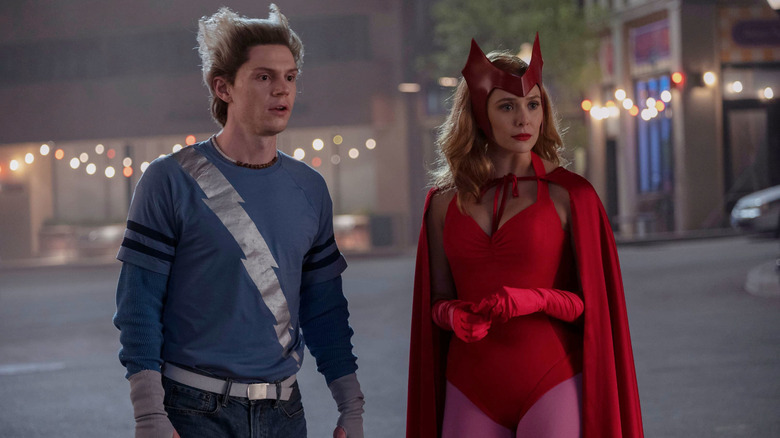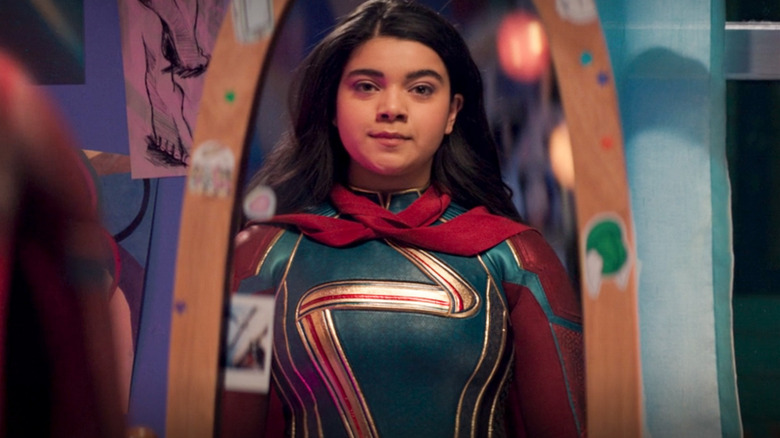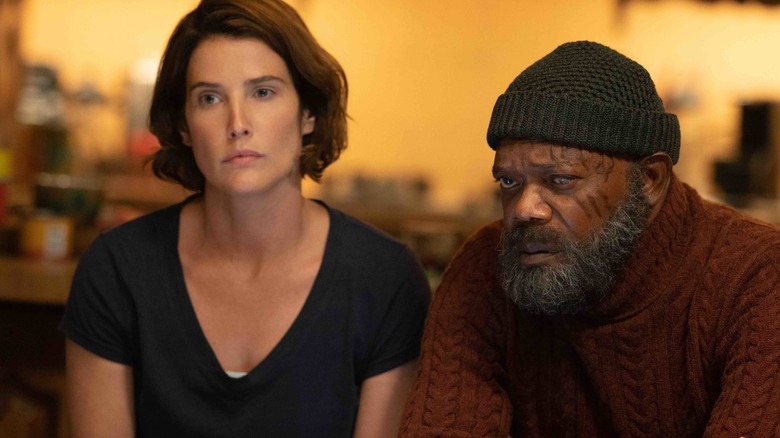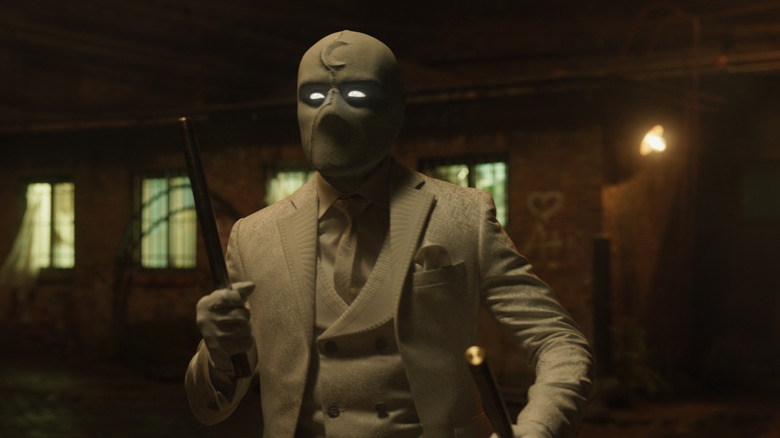The Two Biggest Problems With Marvel's TV Shows Might Not Be Solvable
"Spider-Man: Far from Home," released in July of 2019, was the 23rd film in the Marvel Cinematic Universe and served as a victory lap for the franchise following the release of "Avengers: Endgame" — one of the biggest films of all time — the previous May. That was 23 films in 11 years, released at a pretty steady — but mostly tolerable — clip. From 2008 to 2016, Marvel Studios released two films every year. From 2017 to 2019, it upped its output to three a year. The frantic release schedule, paired with carefully curated press releases, whipped fans into a frenzy of eternal anticipation. In 2019, it seemed like the MCU would never end.
2020 saw no MCU theatrical releases thanks to COVID. The release schedule was thrown way off and the cycle of anticipation was interrupted. To adjust, Marvel began dumping a lot of its resources into MCU-connected streaming shows starting with "WandaVision" in January 2021. The many Netflix/Hulu/network Marvel shows were a separate entity that didn't always tie into the central MCU storyline.
But that changed with "WandaVision," the first Disney+ Marvel show. All of a sudden, there was a massive influx of Marvel material to sift through. Thanks to seven movies and eight TV shows, there were more raw hours of MCU media in Phase Four than in the previous three combined.
In the book "MCU: The Reign of Marvel Studios" by Joanna Robinson, Dave Gonzalez, and Gavin Edwards, it's posited that Marvel's TV show highlighted quantity over quality. This much is obvious. The book also posits, however, that because of the way TV is filmed — on a tight schedule — there's no way to brush up and improve them. The problem with Marvel's shoddy TV shows cannot be fixed.
Marvel Studios couldn't adjust to TV schedules
Marvel Studios' feature films might have adhered to tight release schedules — the studio's fans likely recall its much-ballyhooed "Here are our next 10 films" press releases with fondness — but major Hollywood releases typically schedule in extra filming time for any inevitable reshoots that might be necessary. What's more, the release schedules could be adjusted somewhat, allowing the studio to be the tiniest bit nimble when it came to their groaningly large inter-narrative architecture; some may recall when the "Inhumans" feature film was announced, only to witness that project eventually become a (largely unwatched) TV series.
"MCU" posits that shooting TV shows took comparatively too much time. The studio was now churning out over six hours of scripted content over their usual two-and-a-half. What's more, they had to be sandwiched in between certain feature films, assuring that Marvel's interconnected continuity — the central selling point of the series — was not interrupted. Marvel head honcho Kevin Feige couldn't necessarily go visit their set or oversee editing and reshoots to ensure their homogeneity. With several TV shows and movies all in production at the same time, lines of communication became more difficult to maintain. Feige was too busy to wrangle it all, and it spilled out of his hands.
The shoddy results could be seen immediately. Actor Elizabeth Olsen noted that her character, the Scarlet Witch, transformed from a hero to a villain between "WandaVision" and "Doctor Strange in the Multiverse of Madness" because the authors of both projects weren't talking to each other. Marvel, previously so strict with its world-building, bit off more than it could chew.
Marvel demands a lack of creativity
Another example: in the TV series "Secret Invasion," Nick Fury (Samuel L. Jackson) is old and tired and cynical, wearing of the superhero shenanigans he can no longer wrangle. He drinks a lot of Pappy Van Winkle (which is an expensive hobby). The next time we saw the character, he was living on a space station in "The Marvels," and he was back to being humorous and flippant. Fury's arc, it seems, was not well thought out.
"MCU" also points out that the Marvel TV shows more sharply felt the creative limitations inherent to the Marvel Cinematic Universe. Because the MCU functions as a massive TV series, there is an underlying demand to maintain the status quo. Characters cannot be killed, superheroes may not quit their jobs, and players have to remain in place for future installments. The problem with the TV shows is that a lot of the future installments hadn't been written yet, so every series had to remain kind of open-ended, allowing potential future writers to pick up wherever they wanted. Leaving the shows open, however, robbed them of the ability to present any kind of satisfying conclusions.
This, of course, is a problem with the MCU in general: If a story must continue indefinitely — as they did in comic books — then it bars a certain amount of creativity. Retaining status quo might be expected and easy for a weekly episodic TV series from a previous decade, but when dealing with entire shows and feature films, it can be restrictive. Indeed, not only can your stories not conclude, but there needs to be a lot of foreshadowing (or just outright advertising) for future events.
No one is writing in the present. Everyone is writing in the future.
How do we solve the Marvel problem?
So, how can Marvel Studios solve these problems? There may be no solutions other than to contract. To wane like "Moon Knight."
One might hasten to leap in and suggest that Kevin Feige — or perhaps a successor — retain very close control over the entire MCU and keep a closer eye on the larger, overarching story. If one "showrunner" is overseeing everything, and giving explicit instructions to writers and directors, then perhaps the films and TV shows would mesh more organically and the MCU would feel broad instead of scattered. I couldn't say how satisfying that would be for the writers and directors involved — it's hard to get excited about working on a Marvel show if you're specifically instructed to be uncreative — but it would perhaps ensure a consistency of vision.
The downside to that approach would be its inevitable bolstering of the commonest criticism of the MCU: that it feels really samey and homogenous. One vision across three movies and four TV shows every year? That's a lot of meals that have the same flavor.
Perhaps Marvel Studios could take a radically different approach and permit creative souls to do whatever they might want with a character. Captain America gets Canadian citizenship? Done! Spider-Man dies in a car accident? Done! And then each successive sequel would build on the creative decisions of the last. There is no status quo, just weird artists making interesting stories.
The downside to that, of course, is that Marvel would lose the ability to make its ever-vital, years-in-advance press releases. It couldn't announce what comes next if the status quo could change at any minute.
The real solution? Marvel must shrink. Perhaps even die. There's too much to handle.



